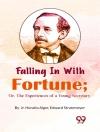Edward Bellamy’s ‘Hooking Watermelons’ is a captivating exploration of 19th-century American life, deftly melding political commentary with a vivid narrative style. Through its meticulous attention to character development and socio-economic critique, the novel presents a nostalgic yet critical view of post-Civil War society. Bellamy employs rich, descriptive prose, crafting scenes that evoke a strong sense of place and time, while intertwining themes of labor, community, and the quest for social justice. This work offers readers insight into the prevailing ideals and struggles of the era, generating discourse around the nascent labor movements and the burgeoning American identity. Edward Bellamy, a prominent figure of the American literary landscape, was deeply influenced by the socio-political climate of his time. His experiences with social inequality and his belief in utopian socialism propelled him to write works that challenged the societal norms of his day. ‘Hooking Watermelons’ reflects Bellamy’s broader vision of a collaborative society, indicative of his pioneering perspectives on economics and ethics, while simultaneously employing elements of realism that capture the essence of American life. For readers interested in historical fiction that stimulates thought and reflection, ‘Hooking Watermelons’ is an essential addition to one’s literary collection. Bellamy’s incisive observations and narrative flair create an engaging experience that resonates with contemporary discussions about social progress and community. This novel not only entertains but provokes critical dialogue about the human condition and the politics of belonging.
A propos de l’auteur
Edward Bellamy (1850–1898) was an influential American author and socialist, most famous for his utopian novel, ‘Looking Backward: 2000-1887, ‘ though no records of a work titled ‘Hooking Watermelons’ are found in his bibliography. Born in Chicopee Falls, Massachusetts, Bellamy attended Union College, but left before completing his degree. He briefly practiced law before turning to journalism and eventually, fiction. Bellamy’s literary style is characterized by his futuristic imagination and his concern for social reform, which is most notably reflected in ‘Looking Backward.’ This particular book describes a utopian society in the year 2000 from the perspective of a person who has fallen asleep in the 19th century and wakes up in a transformed world without poverty, war, or malcontent. Bellamy’s novel directly influenced the formation of the ‘Nationalist Movement, ‘ which sought to implement Bellamy’s vision of a harmonious future. Other notable works by Bellamy include ‘Dr. Heidenhoff’s Process’ and ‘Equality, ‘ which further explore themes of economic and social justice. His work is a cornerstone of utopian literature and continues to be analyzed for its imaginative vision and radical social ideas. Despite the lack of information about ‘Hooking Watermelons, ‘ Bellamy’s legacy as a transformative figure in American literature and social thought is indisputable.












